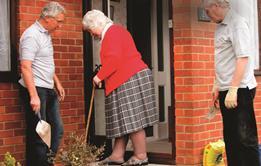Housing associations are crucial to meeting demand and alleviating pressure on the NHS. We desperately need a care revolution, writes Rachael Byrne
A better interface between housing and health care is at the very heart of the NHS’s current challenges. It isn’t just nice to have, it’s key to delivering on two fronts: reduced demand and how to achieve greater efficiencies.

Housing providers have so much to offer GPs and clinical commissioning groups in their pursuit of better health and wellbeing, but this is not generally as well understood as it ought to be.
It is widely recognised that decent housing makes a fundamental difference to mental and physical health and wellbeing and has a critical contribution to make to the value and effectiveness of the health and care system. The memorandum of understanding to support joint action on improving health through the home places a responsibility on health, housing and social care professionals to work together to enable better health and wellbeing outcomes for their local populations. But it’s not simply about the bricks and mortar.
‘Simply integrating what’s already there cannot deliver the sustainable system we require’
The housing sector’s connections with our customers and other hard to reach groups in the community, coupled with our ethos of improving lives (not just managing housing), means that housing providers are well placed to work closely with GPs and primary care specialists to help deliver services, preventing admissions through early support interventions, support people to get back home after a stay in hospital and manage long term conditions which reduce pressure on services.
More from the special report
Common to the experience of many of Home Group’s 30,000 clients through our housing and care work is their reliance on healthcare. Often, they only access services when they are entering crisis. This can lead to greater dependency, making the process of sustained recovery even more challenging, so improving health, and health management is a vital part of the work we do as part of that goal of developing and sustaining independence.
It doesn’t sit as somebody else’s responsibility for us; although we don’t provide the clinical care, we can provide the glue to bring health and social agencies together for the benefit of the client, and work with them practically around living more healthy lives - whether this is through practical advice around lifestyles to more tailored work around individual support needs and access to housing.
At this moment real terms reductions within health and adult social care funding, brought about by the economic realities of reduced public spending and the demographic pressure, will only increase the potential for crisis unless we can work in different ways, and we believe we can offer part of the solution.
Care providers like Home Group can help to improve client and patient experience, with improved outcomes that help to reduce the costs of care, improving efficiency but also reducing demand over the longer term.
‘The models of care we have won’t cope beyond the lifetime of the current forward view’
“Integration” is often held up as the answer. But simply integrating what’s already there cannot deliver the sustainable system we require. To do that we need to look elsewhere and there is a role for housing providers like Home Group and others.
The models of care we have at present won’t cope beyond the lifetime of the current Five Year Forward View. It doesn’t look at preventative services anything near enough nor does it provide care in the way we need it.
We provide the support and care vulnerable people need to live in their own homes, to be able to reintegrate into their communities and become less dependent on health services. Commissioning a service like the one we provide in Norfolk to help people with mental health problems leave hospital on time, at scale, for an annual investment of £1.9m could deliver enough in savings to close down a ward for 24 people and deliver annual saving excess of costs of £500,000.
While providing a 12 bed alternative to admission service could provide a saving of £751,965 on traditional care and the savings generated would pay for the annual cost of the service within just seven months of operating. These are just some of the examples of the kinds of interventions that care and support and housing providers are currently doing.
Such savings will be a critical component of any credible effort to make up the £22bn deficit outlined in the forward view by NHS England chief executive Simon Stevens. Without them, a sustainable future for the NHS is under threat.
We need to ensure more people get the most appropriate care at the most appropriate time, diverting them from chronic reliance on the health service. We desperately need a care revolution to meet demand and alleviate pressure on the NHS. Housing associations will be absolutely key.
Rachael Byrne is executive director of care and support for Home Group
Special report: Health, housing and care are successful together

Case studies in Leicestershire
- 1
- 2
 Currently
reading
Currently
reading
Bring together health and housing




























No comments yet